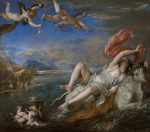Appel à publication : « Mythology as a Source of European Culture » Call for papers to Issue 54 of Perspectives on Culture (3/2026)

Greco-Roman mythology has served as an inexhaustible source of inspiration for artists of past eras, playing a significant role in shaping European art and culture. The deeply humanistic dimension of myth, tied to the origins of human thought, was inherently connected with attempts to understand the world, the laws of nature, the course of life, transience, the human condition, and humanity’s place in the world. The culture-forming role of myth, the accumulation of its various versions, diverse artistic interpretations, and iconographic transformations create a palimpsest reflecting the historical, cultural, and social contexts of the works that emerged over time. Cosmogonic and theogonic myths, the pantheon of gods, personifications of natural phenomena, heroes, hybrid creatures, the ideal of the Arcadian idyll, and transformations of beings—described, among others, in Ovid’s Metamorphoses—stimulated the minds of poets, painters, and musicians, becoming part of the collective imagination. In this context, an especially intriguing phenomenon is the syncretism of Christian culture and the world of mythology—the reception of pagan themes in Christian culture, the presence of mythological motifs in religious and ecclesiastical art, and their use in the propaganda of Christian rulers. This perspective raises important questions: what were the reasons and manifestations of the fusion between mythology and Christian faith and tradition? How were ancient myths adapted and interpreted within a Christian framework? In what ways was the allegorical method used to interpret myths and derive Christian moral teachings from them?We welcome reflections on issues related to mythology within art history, literary studies, philosophy, religious studies, history, education, anthropology, and cultural studies. We encourage broad reflections on the origins and role of myth in culture as well as more specific analyses of the presence of mythology in various areas of human activity, both in historical and contemporary contexts. For example, a possible research topic could be the presence of mythology in court culture, the role and significance of mythological costume in painting, literature, theater, opera, epistolography, and social customs. Consideration of the role of mythological themes in culture will primarily cover the period from the late Middle Ages to the 20th century. However, reflections on the theme may also extend to the present day, seeking answers to questions such as: how does contemporary culture engage in dialogue with the ancient tradition? or, in what ways can the plasticity and materiality of antiquity find continuity in contemporary visual culture?
We invite you to publish texts in English.
Guest Editor of the Issue: Dr Barbara Hryszko
We are looking forward to receiving your articles!
Submission deadline: March 1, 2026
https://czasopisma.ignatianum.edu.pl/pk/announcement/view/64
All guidelines regarding criteria and editorial requirements for texts can be found at: https://czasopisma.ignatianum.edu.pl/pk/about/submissions
This website has an English version (if it is not visible, please switch to the appropriate language version). The article with all its component parts (abstract, 5 keywords, main text, bibliography and biographical note) should be between 20,000 and 30,000 characters long, including spaces. The abstract should be concise and factual with up to 250 words. Title should not be longer than 12 words.
Please submit your articles via the Perspectives on Culture website:
https://czasopisma.ignatianum.edu.pl/pk/about/submissions
https://czasopisma.ignatianum.edu.pl/pk/user/register
Additionally, please send your submissions to the editor of the issue, Dr Barbara Hryszko, at the following address: barbara.hryszko@ignatianum.edu.pl

Leave a Reply
You must be logged in to post a comment.